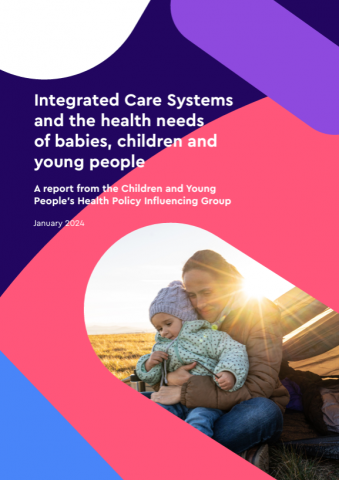Industry leaders have called for better national support after analysis of integrated care systems (ICSs) revealed inconsistencies in how local health systems incorporate the needs of babies, children and young people in their strategies.
A review of 31 ICS strategies and joint forward plans (JFPs) concluded that, while there is good work in the sector in the face of increased demand and financial pressures, more needs to be done.
The research, published by the Children and Young People’s Health Policy Influencing Group, shows that many ICSs did not consider integration with other key services that can improve child health outcomes.
Only around a third (32%) of ICSs did so for education settings, while just two in five (42%) did for children’s social care.
“Babies, children and young people are too often an afterthought…”
The report highlights that ICSs outlined priorities for children’s:
- Mental health
- Obesity
- Early development
- Special educational needs and disabilities (SEND)
- Inequalities
However, nearly three in five (59%) ICS plans did not consider children with major and long-term conditions, while almost a third (27%) of JFPs did not set specific targets to tackle inequalities.
This is in addition to the decision-making around their priorities being unclear.
In a joint statement, the co-chairs of the Children and Young People’s Health Policy Influencing Group, Amanda Allard and Matthew Dodd, said: “Babies, children and young people are too often an afterthought in conversations about addressing inequalities and improving overall life expectancy and wellbeing.”
The group is hosted by the National Children’s Bureau and the Council for Disabled Children. It is a collection of charities, royal colleges and professional associations that campaign for improvements to child health.
Its research also showed that, although there is a requirement to identify named board members that head up the services dedicated to children and young people, safeguarding and SEND, the majority (57%) of JFPs did not.
“But legislation is only part of the puzzle…”
Only in two in five (39%) ICS strategies looked at capacity in the paediatric workforce, while nearly three in five (59%) JFPs failed to address data and information sharing issues in the sector.
The report also found that less than a tenth (6%) of ICS plans and around one in five (17%) of JFPs explained how the voices of babies, children and young people interacted with their work.
“The Health and Care Act 2022 was a step in the right direction, helping focus the attention of Integrated Care Systems on babies, children and young people,” said Allard and Dodd.
“But legislation is only part of the puzzle, and we must not become complacent about ensuring children’s needs are met in practice.”
A series of recommendations accompanied the research, both for ICSs and national government.

Supporting integration to key services through the better care fund is highlighted, along with sharing good practice across local systems.
The requirements for ICSs to specify those who are responsible for the commitments made around the needs of children and young people should also be bulked up, and how they can be contacted.
Children and young people should be more involved in the development of ICS strategies, and citations to how their concerns have been addressed should be clearly set out.
Plus, ICSs should be provided with clear guidance on how to consider the needs of children with major and long-term conditions, as well as other minority and vulnerable groups.
Amanda Allard and Matthew Dodd concluded: “We know that integrated and co-produced services across health, children’s social care and education can improve children’s outcomes and prevent costlier interventions further down the line and we look forward to continuing our work with national government and local systems to ensure this becomes a reality.”
Image credit: iStock



















